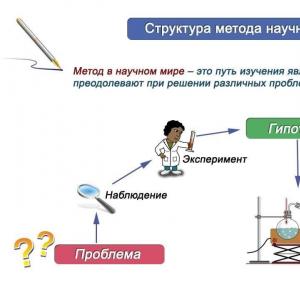Test for the definition of the creative potential of man. Test "Your creative potential"
purpose: Diagnosis of creative potential, creativity.
Instruction. You are invited to answer 17 questions. Each item of this questionnaire contains two statements (A and B). Carefully read each of them and choose something that more matches your point of view.
Do you think that the world around you can be improved?
b) no, he is so good enough;
c) yes, but only in something.
Do you think that you yourself can participate in significant changes in the surrounding world?
a) yes, in most cases;
c) Yes, in some cases.
Do you think that some of your ideas would bring significant benefits in the sphere of activity in which you work?
b) yes, under favorable circumstances;
c) only to some extent.
Do you think that in the future you will play such an important role that you can change something fundamentally?
a) yes, for sure;
b) it is unlikely;
b) maybe.
When do you decide to take some action, do you think that your undertaking?
b) often think that he is not able;
c) yes, often.
Do you experience a desire to do business, which absolutely do not know?
a) Yes, the unknown attracts me;
b) the unknown does not interest me;
c) it all depends on the nature of this case.
You have to engage in unfamiliar business. Do you experience the desire to achieve perfection in it?
b) no, I want to learn only the most basic;
b) No, I just want to satisfy my curiosity.
When you fail, then:
a) for a while persevere contrary to common sense;
b) decide to wave a hand on this idea, as you understand that it is unreal;
c) continue to do their job, even when it becomes obvious that obstacles are insurmountable.
In your opinion, the profession needs to choose, based on:
a) their capabilities, further prospects for themselves;
b) stability, significance, the need of the profession, the need for it;
c) the advantages that it provides.
Traveling, could you easily navigate the route by which already passed?
b) no, I'm afraid to get off the way;
c) Yes, but only where the locality I liked and remembered.
Immediately after some conversation, you can remember what we were talking about?
a) yes, without difficulty;
b) everything will not be able to remember;
c) I remember only what interests me.
When you hear the word in an unfamiliar language, you can repeat it in the syllables without an error, not even knowing his meanings?
a) yes, without difficulty;
b) yes, if this word is easy to remember;
c) I repeat, but not quite right.
In your free time you prefer:
a) stay alone, reflecting;
b) be in the company;
c) you are indifferent, whether you are one or in the company.
You do some job. Decide to stop this lesson, only when:
a) the case is completed and it seems to you perfectly performed;
b) you are more or less satisfied;
c) you still have not done everything.
When you are alone, then:
a) love to dream of some things, even, maybe abstract;
b) at any cost trying to find a specific lesson;
c) Sometimes you like to dream, but about things that are connected with your work.
When some idea captures you, then you will think about it:
a) no matter where you are with whom;
b) only alone with them;
c) only where it will not be too noisy.
When you defend some idea, then:
a) you can refuse it if you listen to convincing arguments of opponents;
b) will remain in its opinion, whatever arguments are listened;
c) Change your opinion if the resistance is too strong.
Processing results. Move your answers to points ("A" \u003d 3 points; "B" \u003d 1 point; "B" \u003d 2 points) and count the amount of points for each of the scales:
Curiosity : 1, 6, 7;
Believe in yourself : 2, 3, 4, 5;
Constability : 8, 14;
Ambitiousness : 9;
Visual memory : 10;
Hearing memory : 11,12;
The desire to be independent : 13;
Abstraction abstract : 15, 16;
Concentration : 17.
Creative potential - These are the professional psychological capabilities of the personality. It is found in the level of development of intelligence, professionalism and socio-professional orientation.
The components of the creative potential of a person are its curiosity, constancy, visual and hearing memory, the ability to abstract and focus, self-confidence and the desire for independence.
The total amount of scores will show the level of your creative potential. If the resulting amount is equal to:
0-21 points - Your creative potential, alas, small. But maybe you just underestimated yourself? The absence of faith in their strength can lead you to the thought that you are not capable of creativity at all. Get rid of it and thus solve the problem.
22-45 points - You have quite normal creative potential. You possess the qualities that allow you to create, but you have problems that slow down the process of creativity. In any case, your creative potential will allow you to show yourself creatively if you, of course, will wish.
46-51 points - There is a significant creative potential in you, which provides you with a rich selection of creative opportunities. If you can actually apply your abilities, you will be available to a variety of forms of creativity.
Test "My creative potential"
Strive to the highest of the goals available to you and do not join the fight because of the straw.
G. Selre
Man by nature the Creator, who is in constant search for new ways to transform the surrounding world. But what is the creative potential for each of us?
The proposed test will help answer this question. For each question of the test you need to select only one answer and write in the form for answering the corresponding letter.
Questions:
1. Do you think that the world around you can be significantly improved?
a) yes; b) no; c) only in anything.
2. Do you think that you yourself can participate in the change of the surrounding world?
a) yes; b) no; c) in some cases.
3. Do you think that some of your ideas would speed up the progress in the area of \u200b\u200bactivity you do?
a) yes;
b) yes, but only under favorable circumstances;.
c) only to some extent.
4. Do you think that in the future you will play such an important role that you can change something fundamentally change?
a) probably; b) unlikely; B) maybe.
5. When do you decide to take something, do you think that you are on the start?
a) yes; b) no; c) yes, sometimes.
6. Do you have a desire to do business, which absolutely do not know?
a) yes;
b) the unknown does not interest me;
c) it all depends on the nature of this case.
7. You have to do unfamiliar business. Do you experience the desire to achieve perfection in it?
a) yes;
b) I am satisfied that I managed to achieve;
c) Yes, but only if I like it.
8. If the case you do not know, you like, do you want to know everything about him?
a) yes, of course;
b) no, I want to learn only the most basic;
c) No, I want to satisfy only my curiosity.
9. When you fail, then:
a) for a while persevere, contrary to common sense;
b) waving his hand on this idea;
c) I continue to do, even when it becomes obvious that obstacles are insurmountable.
10. Based on what will you choose a profession?
a) from their capabilities, prospects for himself;
b) from the need of the profession;
c) from the advantages that it will provide.
11. Traveling, could you easily navigate on the route for which already passed?
a) yes;
b) no;
c) Yes, but only where I liked the locality.
12. Immediately after the conversation, can you remember everything about what it was said?
a) yes, without difficulty;
b) I can't remember everything;
c) I remember only what interests me.
13. When you hear the word in an unfamiliar language, can you repeat it in the syllables without an error, not even knowing it?
a) yes, almost without difficulty;
b) yes, if this word is easy to remember;
c) I can repeat, but not quite right.
14. In your free time you prefer:
a) stay alone, reflecting;
b) to be in the company;
c) to be one or in the company - I am indifferent to me.
15. You are engaged in some reason. Decide to stop this lesson when:
a) the case is completed and it seems to me perfectly performed;
b) I am more or less satisfied with the result;
c) the case is not yet completed.
16. When you are one:
a) I love to dream of abstract affairs;
b) at all costs try to find a specific occupation;
c) Sometimes I love to dream, but about things that are connected with my study.
17. When some idea captures you, you think about it:
a) regardless of where and with whom I am;
b) when I am alone;
c) only where it is not too noisy.
18. When you defend some idea:
a) I can refuse it if you listen to convincing arguments of opponents;
b) remain in her opinion, regardless of the arguments of opponents;
c) I will doubt the arguments of opponents.
Blank for answers
Surname, name _______________ Date ______________
|
Question number |
|||||||||
|
Letter |
|||||||||
|
Glasses |
|||||||||
|
Question number |
|||||||||
|
Letter |
|||||||||
|
Glasses |
Total scores: _____________________
Processing results
For each version of the answer "A" you get 3 points; For the answer "B" - 1 point and for the answer "B" - 2 points.
Interpretation of results
23 points and less.Your creative potential, unfortunately, is small. But maybe you just underestimate yourself?
Exercise "Find yourself"
You need to believe in your strength and knowledge, in your abilities and talent. Believe me that there are no unfulfilled people in the world. Each person has talent deposits, it only needs to be detected. In order for this happened, look for your talent, start various things, try yourself in different areas of activity. And you will definitely find your talent, your place, yourself.
From 24 to 28 points.You have a good creative potential, but there are problems that brake forwarding.
Exercise "Understand yourself"
If you want - you will achieve success, only for this you need to understand yourself deeper, understand that you especially attracts you, to find the sphere of activity in which you can take your talent as much as possible. More often ask yourself: "Is this this thing?"
29 points and more. You have a significant creative potential. If you can actually apply your abilities, you will achieve great success.
Exercise "Save your talent"
You are lucky, since you already know what your talent and where you can show your abilities. But you have a difficult task - to save and develop what you have. Therefore, constantly improve your memory, get new knowledge, create and invent a new one.
Scale:level of Creative Potential (Creativity)
Purpose of dough
Diagnosis of creative potential, creativity.
Description of dough.
Questions diagnose the boundaries of the respondent's curiosity, self-confidence, constancy, visual and auditory memory, the desire for independence, the ability to abstract and focus. These indicators, according to the author of the technique, and there is a component of creative potential.
Instructions for test
Select one of the proposed answers options.
Test
1. Do you think that the world around you can be improved?
1. Yes;
2. No;
3. Yes, but only in some way.
2. Do you think that you yourself can participate in significant changes in the surrounding world?
1. Yes, in most cases;
2. No;
3. Yes, in some cases.
3. Do you think that some of your ideas will bring significant progress in the sphere of activity you choose?
1. Yes;
2. Where can I have such ideas?
3. Maybe not significant progress, but some success is possible.
4. Do you think that in the future you will play such an important role that you can change something fundamentally change?
1. Yes, for sure;
2. Very unlikely;
3. Maybe.
5. When do you decide to do something, is sure that it will work out?
1. Of course;
2. often cover doubts if I can do;
3. More often than unsure.
6. Do you have a desire to do some unknown for you, such a thing in which you are incompetent at the moment, you absolutely do not know him?
1. Yes, any unknown attracts me;
2. No;
3. It all depends on the case and circumstances.
7. You have to do unfamiliar business. Do you experience the desire to achieve perfection in it?
1. Yes;
2. What happens, then well;
3. If this is not very difficult, then yes.
8. If the case you do not know, you like, do you want to know everything about him?
1. Yes;
2. No, it is necessary to learn the most basic;
3. No, I just satisfy my curiosity.
9. When you fail, then:
1. For a while persevere, even contrary to common sense;
2. Immediately wave a hand on this idea, as soon as you understand its unreality;
3. Continue to do its job until common sense shows the insurmandability of obstacles.
10. The profession must be chosen based on:
1. its capabilities and prospects for yourself;
2. Stability, significance, the need of the profession, the need for it;
3. Prestige and advantages that it will provide.
11. Traveling, could you easily navigate on the route for which already passed?
1. Yes;
2. No;
3. If the place liked and remembered, then yes.
12. Can you remember immediately after the conversation everything was said on it?
1. Yes;
2. No;
3. I remember everything that I wonder.
13. When you hear the word on an unfamiliar Yazpse, can you repeat it in the syllables without errors, not even knowing it?
1. Yes;
2. No;
3. I repeat, but not quite right.
14. In your free time you prefer:
1. Stay alone, reflecting;
2. To be in the company;
3. I am indifferent, I will be alone or in the company.
15. You are engaged in some reason. You decide to stop it only when:
1. The case is completed and it seems to you perfectly performed;
2. You are more or less satisfied with the one;
3. The case seems made, although it can still be done better. But why?
16. When you are alone, you:
1. Love to dream of some things, maybe abstract;
2. At any cost trying to find a specific lesson;
3. Sometimes you like to dream, but about things that are related to your affairs.
17. When some idea captures you, then you will think about it:
1. Regardless of where and with whom you are;
2. Only alone;
3. Only where there is silence.
18. When you defend some idea, you:
1. You can refuse it if the arguments of opponents seem convincing to you;
2. Stay with its opinion, whatever arguments nominated;
3. Change your opinion if the resistance turns out to be too strong.
Processing and interpretation of test results
Processing test results
Points are accrued according to the following scheme:
The answer "A" - 3 points, "B" - 1, "B" - 2 points.
Interpretation of test results
. 48 or more points - You have a significant creative potential that represents you a rich selection of creative opportunities. If you can actually apply your abilities, then you have a wide variety of creativity forms.
. 18 - 47 points - You have the qualities that allow you to create, but there are also the barriers to your creativity. The most dangerous is fear, especially in people who are oriented to mandatory success. The fear of failure does the imagination - the basis of creativity. Fear can be social, fear of public condemnation. Any new idea passes through the stage of surprise, surprise, non-recognition, condemnation to others. Fear of condemnation for a new, unusual for other behavior, views, feelings are fighting creative activity, destroys creative personality.
Sources
Rogov E.I. Desk book practical psychologist. Book 2. M., 1999.Test "Your creative potential" Purpose: Reveal the creative potential. If this is relevant for you, then try to find out what your creative potential you have. If you have already taken place as an artist or a musician, then, obviously, the passage of this test should not be of interest to you. Select one of the options for answers. 1. Do you think that the world around you can be improved: a) yes; b) no, he is so good enough; c) Yes, but only in anything. 2. Do you think that you yourself can participate in significant changes in the surrounding world: a) yes, in most cases; b) no; c) Yes, in some cases. 3. Do you consider that some of your ideas would bring significant progress in the sphere of activity in which you work: a) yes; b) yes, under favorable circumstances; c) only to some extent. 4. Do you think that in the future you will play such an important role that you can change something fundamentally: a) yes, for sure; b) it is unlikely; B) maybe. 5. When you decide to take some action, do you think that you are interested in: a) yes; b) you often think that we will not be able; c) yes, often. 6. Do you have a desire to do business, which absolutely do not know: a) Yes, the unknown attracts you; b) the unknown you are not interested; c) it all depends on the nature of this case. 7. You have to do unfamiliar business. Do you experience the desire to achieve perfection in it: a) yes; b) are satisfied with what managed to achieve; c) Yes, but only if you like it. 8. If the case you do not know, you like, do you want to know about it all: a) yes; b) no, you want to learn only the most basic; B) No, you only want to satisfy your curiosity. 9. When you fail, then: a) some time persevere, contrary to common sense; b) wave a hand on this idea, as you understand that it is unreal; c) continue to do their job, even when it becomes obvious that obstacles are insurmountable. 10. In your opinion, the profession should be chosen, based on: a) of their capabilities, further prospects for themselves; b) stability, significance, the need of the profession, the need for it; c) the advantages that it will provide. 11. Traveling, could you easily navigate on the route for which already passed? a) yes; b) no, afraid to get off the way; c) Yes, but only where the locality you liked and remembered. 12. Immediately after some conversation, you can remember everything that said: a) yes, without difficulty; b) just not can remember; c) remember only what interests you. 13. When you hear the word on an unfamiliar language, you can repeat it in the syllables, without a mistake, not even knowing its meanings: a) Yes, without difficulty; b) yes, if this word is easy to remember; c) Repeat, but not quite right. 14. In their free time you prefer: a) stay alone, reflecting; b) be in the company; c) you do not care if you are alone or in the company. 15. You are engaged in some reason. Decide to stop this occupation only when: a) the case is completed and it seems to be perfectly performed to you; b) you are more or less satisfied; c) You have not yet managed to do. 16. When you are alone: \u200b\u200ba) Love to dream of some, maybe abstract things; b) at any cost trying to find a specific lesson; c) Sometimes you like to dream, but about things that are connected with your work. 17. When some idea captures you, you will think about it: a) no matter where and with whom you are; b) you can do it only alone; c) only where it will not be too noisy. 18. When you defend some idea: a) you can refuse it if you listen to convincing opponents arguments; b) will remain with his opinion, whatever arguments are listened; c) Change your opinion if the resistance is too strong. Count the glasses that you scored, so: for the answer "A" - 3 points; For the answer "B" - 1; For the answer "B" - 2. Questions 1, 6, 7, 8 determine the boundaries of your curiosity; Questions 2, 3, 4, 5 - faith in yourself; Questions 9 and 15
- constancy; Question 10 - ambitiousness; Questions 12 and 13 - "auditory" memory; question 11 - visual memory; Question 14 - Your desire to be independent; Questions 16, 17 - ability to abstract; Question 18 is a degree of concentration. The total amount of scored points will show the level of your creative potential. 49 and more points. You have a significant creative potential that represents you a rich choice of opportunities. If you can actually apply your abilities, then you have a wide variety of creativity forms. From 24 to 48 points. You have quite normal creative potential. The focus of the qualities that allow you to create, but you have and problems that brake the process of creativity. In any case, your potential will allow you to creatively show yourself if you, of course, will wish. 23 or less points. Your creative potential, alas, is small. But, perhaps, you just underestimated yourself, your abilities? The absence of faith in their strength can lead you to the thought that you are not capable of creativity at all. Get rid of it and thus solve the problem.
View the contents of the document
"Test" Your creative potential ""
Test "Your creative potential"
Purpose: to identify creative potential.
If this is relevant for you, then try to find out what your creative potential you have. If you have already taken place as an artist or a musician, then, obviously, the passage of this test should not be of interest to you.
Select one of the options for answers.
1. Do you think that the world around you can be improved:
a) yes;
b) no, he is so good enough;
c) Yes, but only in anything.
2. Do you think that you yourself can participate in significant changes in the surrounding world:
a) yes, in most cases;
b) no;
c) Yes, in some cases.
3. Do you think that some of your ideas would bring significant progress in the sphere of activity in which you work:
a) yes;
b) yes, under favorable circumstances;
c) only to some extent.
4. Do you think that in the future you will play such an important role that you can change something fundamentally:
a) yes, for sure;
b) it is unlikely;
b) maybe.
5. When you decide to take some action, do you think that you are interested in:
a) yes;
b) you often think that we will not be able;
c) yes, often.
6. Do you have a desire to do business, which absolutely do not know:
a) Yes, the unknown attracts you;
b) the unknown you are not interested;
c) it all depends on the nature of this case.
7. You have to do unfamiliar business. Do you experience a desire to achieve perfection in it:
a) yes;
b) are satisfied with what managed to achieve;
c) Yes, but only if you like it.
8. If the case you do not know, you like, do you want to know everything about him:
a) yes;
b) no, you want to learn only the most basic;
b) No, you only want to satisfy your curiosity.
9. When you fail, then:
a) some time persevere, contrary to common sense;
b) wave a hand on this idea, as you understand that it is unreal;
c) continue to do their job, even when it becomes obvious that obstacles are insurmountable.
10. In your opinion, the profession must be chosen based on:
a) their capabilities, further prospects for themselves;
b) stability, significance, the need of the profession, the need for it;
c) the advantages that it will provide.
11. Traveling, could you easily navigate on the route for which already passed?
a) yes;
b) no, afraid to get off the way;
c) Yes, but only where the locality you liked and remembered.
12. Immediately after some conversation, you can remember everything that said:
a) yes, without difficulty;
b) just not can remember;
c) remember only what interests you.
13. When you hear a word on a non-strange language, you can repeat it in syllables, without an error, not even knowing it:
a) yes, without difficulty;
b) yes, if this word is easy to remember;
c) Repeat, but not quite right.
14. In your free time you prefer:
a) stay alone, reflecting;
b) be in the company;
c) you do not care if you are alone or in the company.
15. You are engaged in some reason. Decide to stop this occupation only when:
a) the case is completed and it seems to you perfectly performed;
b) you are more or less satisfied;
c) You have not yet managed to do.
16. When you are alone:
a) love to dream of some, maybe abstract things;
b) at any cost trying to find a specific lesson;
c) Sometimes you like to dream, but about things that are connected with your work.
17. When some idea captures you, then you will think about it:
a) no matter where you are with whom;
b) you can do it only alone;
c) only where it will not be too noisy.
18. When you defend some idea:
a) you can refuse it if you listen to convincing arguments of opponents;
b) will remain with his opinion, whatever arguments are listened;
c) Change your opinion if the resistance is too strong.
Count the glasses that you scored, so:
for the answer "A" - 3 points;
for the answer "B" - 1;
for the answer "B" - 2.
Questions 1, 6, 7, 8 determine the boundaries of your curiosity;
questions 2, 3, 4, 5 - faith in yourself; Questions 9 and 15
Constancy; Question 10 - ambitiousness; Questions 12 and 13 - "auditory" memory; question 11 - visual memory; Question 14 - Your desire to be independent; Questions 16, 17 - ability to abstract; Question 18 is a degree of concentration.
The total amount of scored points will show the level of your creative potential.
49 and more points. You have a significant creative potential that represents you a rich choice of opportunities. If you can actually apply your abilities, then you have a wide variety of creativity forms.
From 24 to 48 points. You have quite normal creative potential. The focus of the qualities that allow you to create, but you have and problems that brake the process of creativity. In any case, your potential will allow you to creatively show yourself if you, of course, will wish.
23 or less points. Your creative potential, alas, is small. But, perhaps, you just underestimated yourself, your abilities? The absence of faith in their strength can lead you to the thought that you are not capable of creativity at all. Get rid of it and thus solve the problem.







